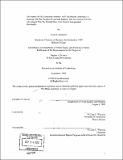The future of the timeshare industry : will the brands dominate? : A summary of the vacation ownership industry and an analysis of the advantages that the brands have over smaller independent developers
Author(s)
Bornstein, Ethan S., 1973-
DownloadFull printable version (4.528Mb)
Other Contributors
Massachusetts Institute of Technology. Dept. of Urban Studies and Planning.
Advisor
William C. Wheaton.
Terms of use
Metadata
Show full item recordAbstract
The timeshare industry has transformed since its introduction to the United States nearly thirty years ago. Suffering from its early beginnings of dubious business practices and negative consumer perception, timesharing has evolved into a credible and growing source to the real estate industry. The concept of timeshare, at its simplest level, is dividing up condominium style residences into weekly increments, commonly referred to as intervals, which are sold to consumers in perpetuity or for a period of time. Timesharing has experienced explosive growth reaching four billion dollars in U.S sales in 2001 with compounded annual growth of over fourteen percent during the past twenty years. Over eighty-five percent of all timeshare owners are satisfied with their purchases. It is estimated that less than two percent of the U.S population own timeshares. With the convergence of the baby-boomer generation fueled with disposable income to spend on vacation experiences, the potential for growth is enormous. Industry insiders and the public mainly credit growth and consumer acceptance of timesharing due to the entry of large branded companies such as Marriott, Starwood, Disney, and Hilton. These companies have brought a degree of credibility and innovation to the industry that was lacking in the earlier part of its existence. Today, the industry is dominated by smaller independent companies who account for seventy-five percent of the market, but the brands continue to increase their market share. Will the timeshare industry mimic the consolidation of the hotel industry thirty years ago? This thesis paper will synthesize the pertinent aspects of the timeshare industry in order to establish a framework for those readers unfamiliar with the industry. It will also investigate and analyze the key reasons and competitive advantages that brands have over smaller independent developers. The thesis concludes that brands will dominate the timeshare industry due to five key factors: credibility/quality/ brand awareness; financial and economic advantages; sales and marketing; liquidity and flexibility; and consolidation.
Description
Thesis (S.M.)--Massachusetts Institute of Technology, Dept. of Urban Studies and Planning, 2002. Includes bibliographical references (leaves 42-44).
Date issued
2002Department
Massachusetts Institute of Technology. Department of Urban Studies and PlanningPublisher
Massachusetts Institute of Technology
Keywords
Urban Studies and Planning.